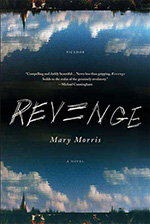
The other morning bright and early I got up to go get my visa to India. It was a freezing cold morning and I'd bundled up. I had a reservation and, surprisingly for me, I arrived on time, only to find a line out the door. I thought the fact that I had a 10:40 reservation would be relevant, but apparently it was not. The guy before me had a 9:40 reservation. It was going to be a long morning and I had to get to work.
I was perhaps fifteenth in line so I thought I should go up and tell the Hispanic guard with the walkie talkie and wire in his ear that I had an appointment. A woman in a fur coat with a red-dyed fur hat was putting on her mascara behind me and I asked her if she'd hold my place. "I'm not in line," she told me in a thick Russian accent.
As I approached the guard, a Russian man (the husband of the woman in fur, it turns out)with a lot of dandruff was shouting at the guard about not having an appointment but needing a visa. The Russian man was going into a long, complicated story about his documents and his need to travel, but the guard would have none of it. "Go to the back of the line, sir."
Just then an elderly Indian man approached and said that he too had to get a visa and he couldn't wait. "Do you have a reservation, sir?" the guard asked. The man replied he did not but he required a visa. "But do you have a reservation." Once more the man said he did not. This elderly gentlemen was nicely dressed with a cap on his head that looked "ethnic" to me. I'm not sure how else to describe it, but the matter took a kind of cultural turn. This gentleman began shouting at the security guard.
Meanwhile the Russian was still trying to explain his problem, but the guard began shouting back at the Indian gentleman that he needed a reservation. Around me a Sikh in an orange turban was yelling into his cellphone in a language I did not know. Other people of Indian descent were also on their phone, some crying, some begging for documents from family members. "I need my birth certificate," I heard one girl sob. "Fax it to me."
When the elderly gentleman refused to take no for an answer, the guard called upstairs for backup. "I need help down here," he said. When a woman appeared, he shouted in Spanish, "I need some one to tell this crazy asshole to go away." I'm not sure who understood him, but I did.
Finally the manager of the visa venue came outside in his shirt sleeves on a freezing day. "No walk-ins, absolutely no walk-ins. You must have a reservation," he shouted in a distinctly German accent to the angry elderly gentleman and the Russian man who were now both screaming.
There was lots of rumbling from the crowd. Some people left. Many did not have a reservation. The line shortened.
Things settled down. After about half an hour, I was first in line. I was told to turn off my cellphone and prepare my documents, which I did. Then I got upstairs where there were two more very long lines, one that snaked around, and one where you had to wait to get your documents examined.
After about fifteen minutes a woman asked me to come up to the front. She looked over everything. Said all was in order, but I didn't have enough pages in my passport for the India visa and therefore I was denied.
"What do you mean?"
"You need visa pages in your passport. You have only one page available. You need two."
"But no where did it say I needed two."
"Well, you do."
This is what I get for traveling so much.
I was told I had to go to the US passport office and there I would be issued new pages or a new passport, depending on what I preferred, but that I would have to make an appointment for this and that could take several days (which it did). Before leaving I thought I should make another appointment for my visa, but on the way to the computers, I ran into the manager who asked me my problem and I explained about my passport pages.
He nodded, then made a sweeping gesture of the room that was filled with the troubled, turmoiled masses, snaking slowly around in their lines. "Why don't you just mail your application in?"
"May I?"
"Why would you ever want to come back here again?" The question for him was clearly rhetorical, but I couldn't help but note the disdain in his voice. His message to me was coded. Because it was clear to him that I was white and educated and many who frequented his establishment were not.
I made a mental note that I would not mail my application; I would return in person if I could.
As I walked out, the Hispanic bouncer asked me why I was leaving so soon. "My passport doesn't have enough pages."
He shook his head, his voice filled with pity. "That's a bummer," he said.
On the packed subway, heading to Grand Central, I needed to write some of this down, but I had nothing to write on. So I took out a piece of paper and tried to scribble notes on the pole. A young man of mixed race asked if I wanted to sit down. "No, thank you. I'm getting off at the next stop."
"But you're trying to write on that pole." I shugged and he held up his hand to me. Not knowing what else to do, I high fived him. He looked a little stunned, then he burst out laughing. "I was holding it up for you to write on it," he said.
As we pulled into Grand Central, I wished him a good day. On the train to work I nibble from the snack bag Larry had prepared for me. My purse is always filled with all kinds of things - gloves, water bottles, snacks, pens, life savers. I wasn't paying that much attention. I was reading and nibbling. Then I ate a dog treat. Apparently I also had a bag of these.
I sat back, gazing as the train crossed the Harlem River, a part of my commute to work I always love. So, I thought, the journey has begun...














